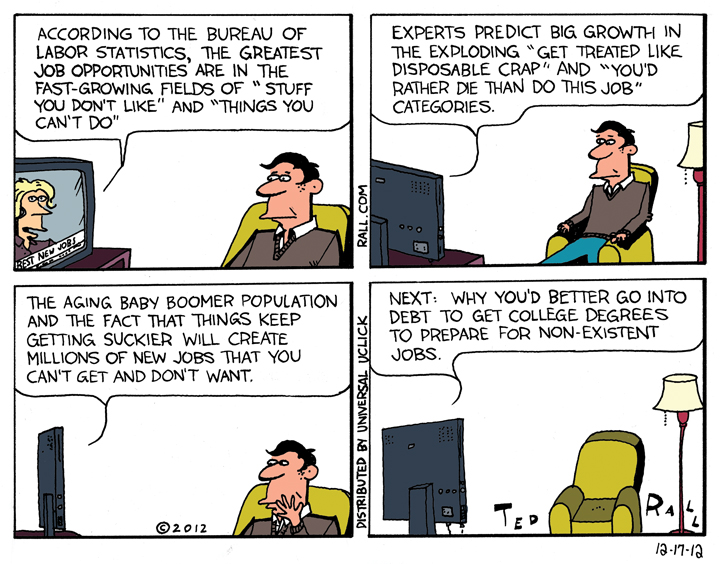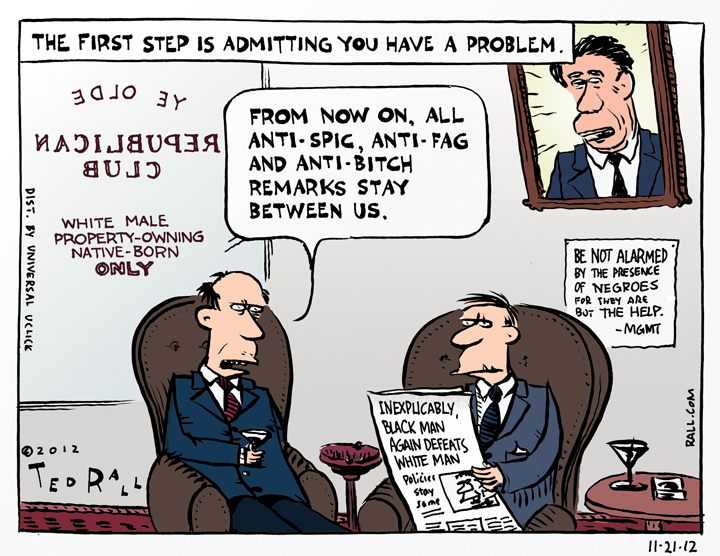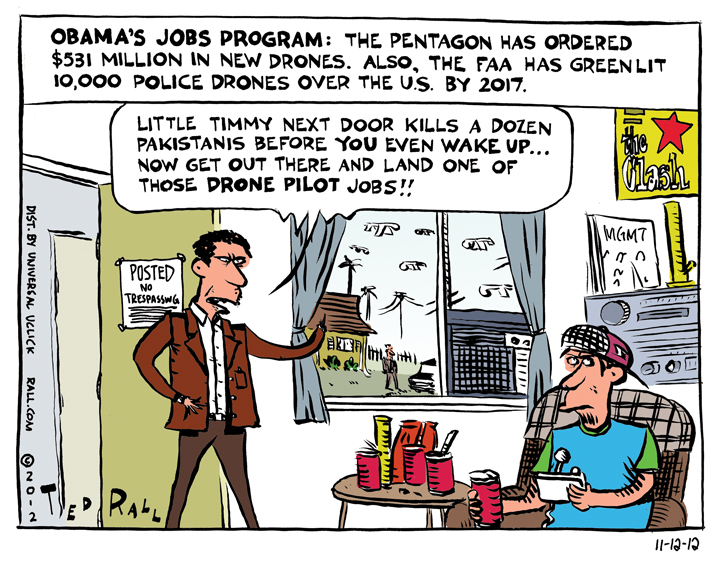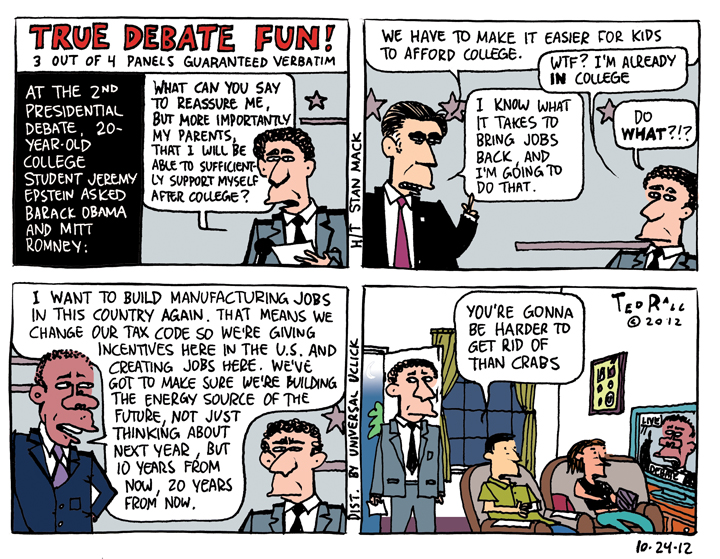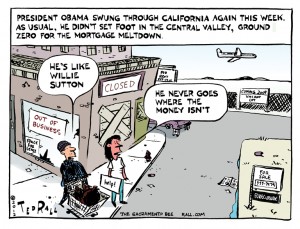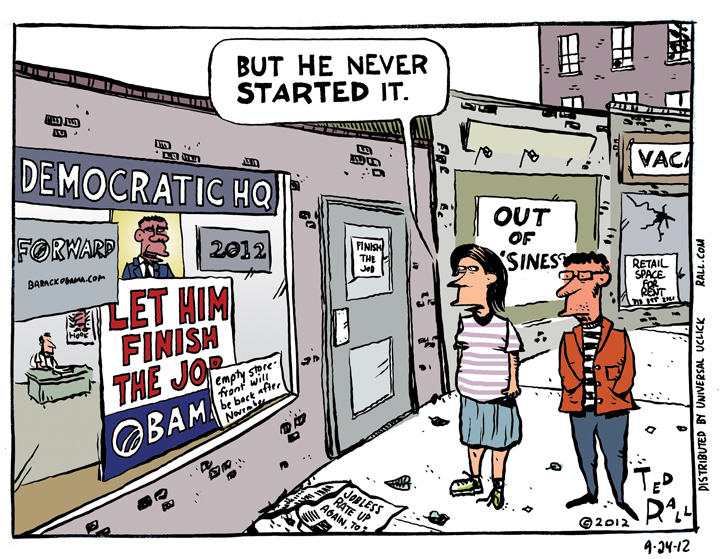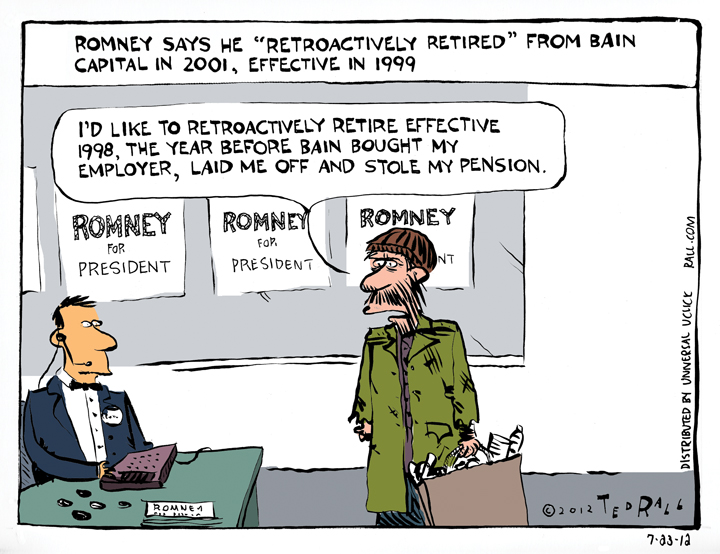Get aboard the job train: the jobs of the future are the jobs you don’t want.
SYNDICATED COLUMN: Our Contempt is Bipartisan
Both Zombie Parties Too Stubborn To Admit They’re Dead
Neither party gets it.
They both think they won. And they sort of did.
But we still hate them.
Democrats are patting themselves on the back, congratulating themselves for a mandate that neither exists–50.4% to 48.1% does not a mandate make–nor, if were real, would be actionable (Republicans still control the House). “Republicans need to have a serious talk with themselves, and they need to change,” Democratic columnist E.J. Dionne sniped in the Washington Post.
Not likely. If Republicans could change anything, it would be the weather. “If you hadn’t had the storm, there would have been more of a chance for the Romney campaign to talk about the deficit, the debt, the economy,” Karl Rove told the Post. (Which leaves out the fact that the places hit hardest by Hurricane Sandy, New York and New Jersey, are not GOP states.)
“We [Congressional Republicans] will have as much of a mandate as he [Obama] will,” claimed Speaker John Boehner.
The donkeys and the elephants think they’re awesome. Their plan to govern America for the next four years? Keep on keeping on. Why change?
Both parties are insane and self-delusional.
Voters are narrowly divided between the Ds and the Rs–because we can’t decide which one we hate most.
One out of three people think the two-party system is broken, and complain that neither party represents their political views.
A staggering number of people are boycotting quadrennial exercises in pseudodemocracy. Despite the advent of convenient early voting by mail, Election Day 2012 saw a “major plunge in turnout nationally” compared to 2008. About 42.5% of registered voters stayed home this year.
There were a substantial number of protest votes.
In one of the most ignored and interesting stories coming out of Election Day, one and a half million people voted for Libertarian Gary Johnson and Green Party candidate Jill Stein. Since Johnson and Stein were even more thoroughly censored than previous third-party candidates–Johnson and Stein were denied interviews on the major networks and locked out of the presidential debates–many of these votes must have been for “none of the above.”
Democrats didn’t win this election.
Neither did the Republicans.
Give the parties credit: They’ve united us in our contempt. Liberals and progressives hate the Democrats, which takes their votes for granted and ignores them. Conservatives hate the GOP for the same reasons. And moderates hate both parties because they don’t get along.
Who won? Not us.
Since the economy collapsed in 2008, Americans have made consistently clear what their number-one priority was: jobs. Yet the two major parties have focused on anything but.
The Tea Party convinced Republicans to campaign on paying down the national debt. Deficits, the debt and entitlements are important–but those problems are not nearly as urgent as unemployment and underemployment. When you’ve lost your job–as millions of Americans have since 2008–you need a new job now. Not next week. Not next year. NOW. You sure don’t need a job next decade–and that’s if you believe that austerity stimulates the economy. “Romney is not offering a plausible solution to the [unemployment] crisis,” Jonathan Chait wrote in New York magazine back in June. Romney never did.
And that’s why he lost.
Jobs were the #1 issue with voters, Obama never reduced unemployment and Romney had a credible narrative as a corporate turnaround expert. By all rights, Romney should have won. But he never delivered what voters wanted: a credible turnaround plan for the terrible jobs market–one with quick results.
Not that Obama and the Democrats have much to celebrate.
The president nearly lost to one of the worst challengers of all time, a bumbling, inarticulate Monopoly Man caricature of an evil capitalist. Democrats only picked up a few seats in Congress–this to a Republican Party whose platform on social issues was lifted from the Taliban, and whose major political figures included two rape apologists.
Like the GOP, Democrats paid lip service to the economy but never put forward a credible proposal that would have created millions of new jobs next week, not next decade. In 2009, while millions were losing their homes to foreclosure, Obama dwelled instead on healthcare reform. Like the deficits, the healthcare crisis is real and important–but it wasn’t nearly as urgent as the jobs catastrophe. Which, planted stories about fictional recoveries to the contrary, continues unabated.
Four years into an existential crisis that likely marks the final crisis of late-stage capitalism, an economic seizure of epic proportions that has impoverished tens of millions of Americans and driven many to suicide, the United States is governed by two parties that don’t have a clue about what we want or what we need.
Change? Not these guys. Not unless we force them to–or, better yet, get rid of them.
(Ted Rall‘s is the author of “The Book of Obama: How We Went From Hope and Change to the Age of Revolt.” His website is tedrall.com.)
COPYRIGHT 2012 TED RALL
True Debate Fun
At the second presidential debate on Long Island, 20-year-old college student Jeremy Epstein asked President Obama and Governor Mitt Romney what either of them could say to his worries that he wouldn’t be able to find gainful employment after graduation. Neither of them had anything to say–but that didn’t stop them.
SYNDICATED COLUMN: The Rebranding of the President, 2012
Why Is Obama Running on His Record?
“It’s not clear what [President Obama] is passionate to do if he is elected for another four years,” writes David Brooks, conservative columnist for The New York Times. “The Democratic convention is his best chance to offer an elevator speech, to define America’s most pressing challenge and how he plans to address it.”
Addressing the DNC Wednesday night, Bill Clinton came as close as any Democrat has this year to answering Brooks: “In Tampa, the Republican argument against the president’s reelection was pretty simple: We left him a total mess, he hasn’t finished cleaning it up yet, so fire him and put us back in. I like the argument for President Obama’s reelection a lot better.”
Nicely done—though this argument only works for voters stuck in the two-party trap. But the biggest piece is still MIA: Obama’s domestic and foreign policy agenda for a second term.
Two principal arguments are being advanced in favor of Obama’s reelection: first, that he “took out” Osama bin Laden; second, that we are “absolutely” better off economically than we were four years ago. These arguments, if they continue to be the Democrats’ main talking points, will lead Obama to defeat this fall.
U.S. history shows that the candidate who presents the most optimistic vision of the future usually prevails. The future he sells doesn’t have to be specific (Romney’s 12 million new jobs, say). Ronald Reagan, who projected vague aw-shucks optimism reflected by a 100%-pabulum campaign slogan, “It’s Morning in America,” defeated Jimmy “Malaise” Carter and Walter “Let’s Tell the Truth About Taxes” Mondale. (Never mind that Carter and Mondale were more honest, smarter and nicer.)
Obama followed the Reagan model in 2008: hope, change, charming smile, not a lot of specifics. And it worked. (It didn’t hurt to run against McCain, the consummate “get off my lawn, you damn kids” grouch.) So why is Obama trading in a proven winner? Why is he running on his first-term record?
Obama’s entourage has obviously talked themselves into believing that the president’s record is better than it really is—certainly better than average voters think it is. Grade inflation is inevitable when you evaluate yourself. (In 2009, at the same time the Fed was greasing the banksters with $7.77 trillion of our money—without a dime devoted to a new WPA-style jobs program—he gave himself a B+.)
First, the extrajudicial assassination of bin Laden, an act of vengeance against a man in hiding who had been officially designated to pose no threat since at least 2006, makes some people queasy. Sure, many voters are happy—but getting even for crimes committed more than a decade ago still doesn’t spell out an optimistic vision for the future.
Similarly, and perhaps more potently since jobs are the most important issue to Americans, claiming that we are better off than we were four years ago, either personally, or nationally, is a dangerous argument for this president to make. Four years ago marks the beginning of a financial crisis that continues today. GDP remains a low 1.7%. Credit remains so tight that it’s still strangling spending.
Four million families lost their homes to foreclosure, millions more were evicted due to nonpayment of rent, and a net 8 million lost their jobs under Obama. Structural unemployment is rising. New jobs are few and pay little.
Most Americans—by a nearly two-to-one margin—feel worse off now than they did four years ago. Coupled with the media’s ludicrous claim that the recovery began in mid-2009, Obama’s “who are you going to believe, me or your lying eyes” (or pocketbook) sales pitch is so insulting and reminiscent of George H.W. Bush’s tone-deaf attitude during the 1992 recession that it can only prove counterproductive.
The historical lesson for Obama is 1936. Franklin Roosevelt is the only president in recent history to have won reelection with unemployment over 8%, as it is currently (it was 17%). Why? FDR’s New Deal showed he was trying hard. And things were moving in the right direction (unemployment was 22% when he took office). Fairly or not, Obama can’t beat Romney pointing to improvement statistics don’t show and people don’t feel.
Obama must articulate a new vision, relaunching and rebranding himself into something completely different—in other words, running as though the last three four years had never happened. Like this was his first term.
New image. New ideas. New policies. New campaign slogan.
Not only does Obama need to float big new ideas, he needs to convince voters that he can get them through a GOP Congress. Not an easy task—but there’s no other way.
It isn’t enough to simply say that Romney will make things worse. Lesser-evil arguments are secondary at best. As things stand now, with people angry and disappointed at government inaction on the economy, Romney’s “Believe in America” meme—though stupid—is more potent than Obama’s reliance on fear of a Ryan budget.
(Ted Rall’s new book is “The Book of Obama: How We Went From Hope and Change to the Age of Revolt.” His website is tedrall.com. This column originally appeared at NBCNews.com’s Lean Forward blog.)
COPYRIGHT 2012 TED RALL

